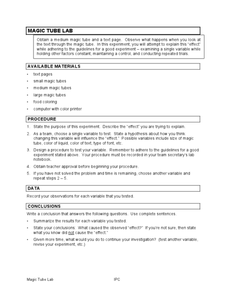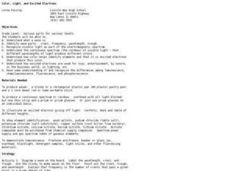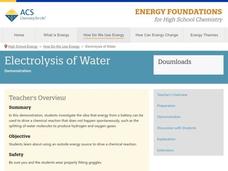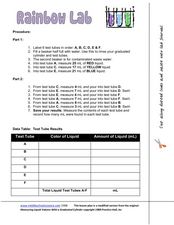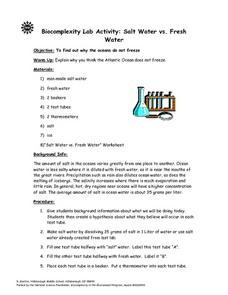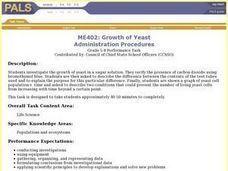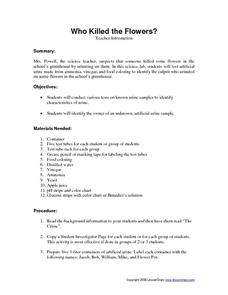Curated OER
Magic Tube Lab
In this scientific investigation worksheet, students use "magic tubes" to make observations, hypothesize, study variables in experiments, write procedures, and draw conclusions.
Curated OER
6260 Atoms Test
In these chapter test worksheets students will multiple choice questions on atoms. Students will complete 77 questions on atoms to complete the chapter test.
Curated OER
Cup Capacity Tool: Measuring Cup
Students examine containers and their capacity. They fill a one-cup measuring cup with water and pour cups of water into other containers. Through observation, students discover how many cups make a pint, and how many teaspoons make a...
It's About Time
Renewable Energy Sources - Solar and Wind
There has been a huge solar energy spill! Let's go outside to play in it. This lesson includes multiple experiments showcasing solar and wind energies. Scholars build a solar heater and an anemometer before testing the results. The...
Curated OER
Diffusion across a Selectively Permeable Membrane
Lab groups fill a section of dialysis tubing with glucose and starch solutions and suspend it in a water bath. They use iodine as a starch indicator and a glucose test strip to find out if either of the materials crossed the selectively...
Curated OER
Color, Light, and Excited Electrons
Investigate color, light and excited electrons and produce waves using slinkys. Your high schoolers will observe a continuous spectrum with a prism and an overhead projector. They observe flame tests to identify elements and they observe...
American Chemical Society
Electrolysis of Water
Young scientists know that water is H2O, but can they prove it? Through a simple electrolysis of water demonstration, scholars see the two gases produced as a result of a chemical reaction. Because this reaction doesn't happen...
Scholastic
Study Jams! The Respiratory System
Inhale, exhale, and rest easy when looking for a supportive tool for your activity on the respiratory system. Seven slides introduce the class to the function of the organs: lungs trachea, diaphragm, bronchial tubes, bronchioles, and...
Curated OER
Rainbow Lab
In this mixtures instructional activity, students experiment with different amounts of solutes and solvents to make solutions. They observe color changes and look for chemical and physical changes in the test tubes. Students answer 5...
Curated OER
Infectious Disease Detectives
Students participate in a simulation of how diseases are transmitted. Each student holds a test tube, with only one containing the "disease" while the others have water. They move around the room until told to stop. Using droppers to...
Curated OER
My Type of Mixture
In this mixture instructional activity, students fill two test tubes with water and add starch to one and salt to the other. They stir the solutions and observe their appearance. They answer four questions about their mixtures and...
Curated OER
Salt Water vs. Fresh Water
Young scholars explore why the oceans do not freeze. They explain why they think the Atlantic Ocean does not freeze. Students are given background information about what they are doing. They create a hypothesis about what they believe...
Curated OER
3-D Magnetic Field
In this magnetism worksheet, students build a 3 dimensional magnetic field by using a juice bottle, a test tube, iron fillings and a magnet. Students write a descriptive story about what they observe once their bottle is complete and...
Curated OER
Rate of Photosynthesis
Students investigate the rate of photosynthesis using elodea leaves. In this photosynthesis lesson plan, students place elodea in a test tube filled with water. They include baking soda and place the test tube under a lamp. Students...
Curated OER
Measuring the Heat Energy of a Chemical Change
Students investigate the Law of Conservation of Energy and the relationship between heat and temperature. For this heat energy and chemical changes lesson, students observe a candle heating a paper cup of water and make predictions about...
Curated OER
Change of State
Students investigate the change of states of Butyl Stearate and the temperatures at which it changes state. In this change of state lesson plan, students place a test tube of Butyl Stearate in a cold water bath and monitor its...
Curated OER
ME402: Growth of Yeast
Students investigate the growth of yeast in a sugar solution. They verify the pressure of carbon dioxide using bromothymol blue. Students are asked to describe the difference between the contents of the test tubes used and to explain...
Curated OER
Tracking the Monster
High schoolers exchange fake bodily fluids with other students. They track the spread of the "infection" throughout the population of high schoolers and determine where the infection began in the class. Every student in the class...
Curated OER
Radiation and Color
Tenth graders explore the relationship between color and heat absorption by measuring the temperature change of water in differently colored test tubes as they are exposed to a heat lamp. They work in small groups to collect data and...
Curated OER
Testing for Catalase Activity
In this catalase activity, learners read about how enzymes work in cells. Then students conduct an experiment to test for catalase activity in potatoes. This activity has 1 graph and 6 short answer questions.
Curated OER
Factors Which Affect the Rate of Chemical Reactions
Students complete an experiment with Alka-Seltzer and reaction rates. They control the rate in which gases are allowed to escape. They test their predictions and observe what happens during the experiment.
Curated OER
Macromolecule Lab
During a macromolecule lab, young chemists perform multiple tests, including iodine starch tests, to determine if eight mystery foods contain lipids, sugars, or starches.
Curated OER
Acid-Base Indicators
The first two pages provide a chart to complete with results of a lab test using different solutions and indicators. The data analysis questions will help your students understand the concentrations of the solutions and how they affect...
Lesson Snips
Who Killed the Flowers?
This could be really good, or it could be really bad! The crime to be solved is, "Who went pee in the flowerpot?" Given four imitation urine samples, young chemists or crime scene investigators perform pH, glucose, and turbidity...
